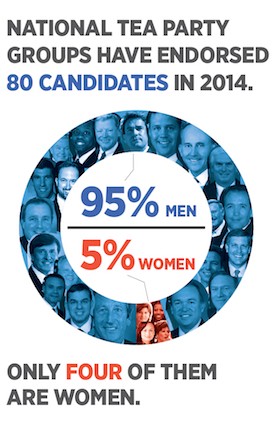Women aren’t invited to the tea party this year.
National Tea Party organizations play a major role in Republican primary elections, helping boost far-right candidates with money, volunteers, and attention. These groups include Tea Party Express, Tea Party Patriots, Senate Conservatives Fund, FreedomWorks, and Club for Growth, the last two of which existed before the 2009 rise of the Tea Party but nonetheless share a virtually identical mission in GOP primaries.
However, much like the Republican Party they aim to take over, the Tea Party has its own woman problem.
Of 80 candidates who were endorsed or funded by national Tea Party groups so far this election cycle, just four were women, a ThinkProgress examination revealed. Two of those four — Katrina Pierson and Karen Handel — have already lost their primaries, while Joni Ernst is leading in the Iowa Republican Senate primary and Mia Love is the Republican nominee in Utah’s fourth congressional district.

Though the overall number of Republican women running for Congress has dropped this year, the Tea Party is not supporting the vast majority who have thrown their hat in the ring. The Center for American Women and Politics at Rutgers University has identified 74 women running or likely to run this cycle. In addition, the Tea Party has been heavily involved in recruiting candidates to run for office, and thus bear some responsibility if they find a dearth of conservative women candidates.
What’s more, multiple women currently serving in Congress have faced attack ads from the Tea Party. Club for Growth has spent money to defeat Reps. Martha Roby (R-AL) and Renee Ellmers (R-NC), both of whom were elected with Tea Party support in 2010.
Conservatives and the Republican Party as a whole have developed a reputation for attacks on women. This was especially evident in recent election cycles where two Republican Senate nominees, Todd Akin and Richard Mourdock, both lost to Democrats in red states after espousing their views on rape and abortion. The party’s “war on women” image is also reflected in the gender gap among voters. In 2012, women voted for President Obama by a 55–44 margin, whereas men opted for Mitt Romney 52–45, an 18-point gender gap.
National Republicans have expressed concern about the ongoing problem their party has with women. “We recognize that we need to speak to single women under 35,” Republican National Committee Chairman Reince Priebus said recently. “It’s a demographic issue that we want to do better with.” Indeed, following their loss in the 2012 presidential election, Republicans released an autopsy that determined acknowledged “the Party’s negative image among women” and the “growing unrest within the community of Republican women frustrated” by that fact. The GOP establishment created several outreach arms ahead of the midterms specifically to pitch women and non-white voters. Many of these efforts have thus far gone awry.
However, concern over the party’s anti-woman image seems yet to have sunk in with Tea Party activists. Given the Tea Party’s continued control of the Republican Party’s policies and base, until it begins recruiting and endorsing more women candidates, it will continue alienating huge swaths of voters.
ThinkProgress intern Abigail Bessler contributed to this article.
